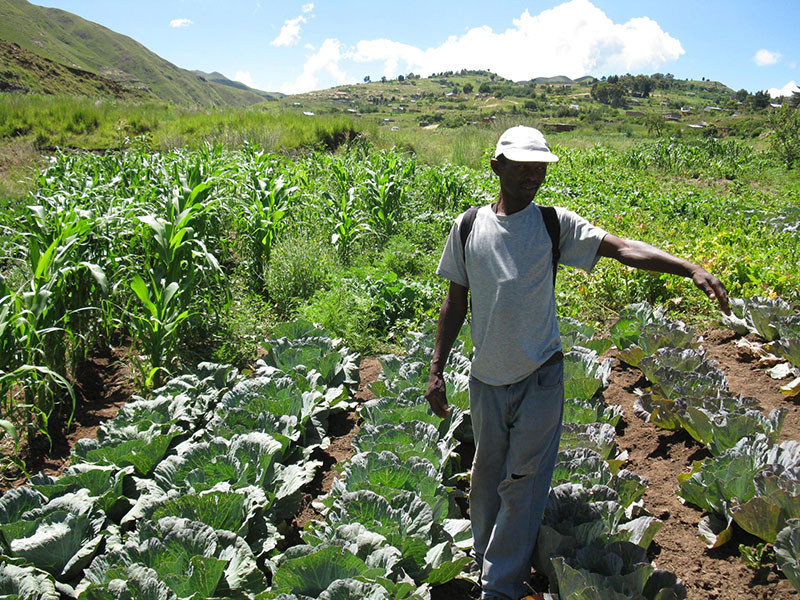One way to resist capitalist food production
Agroecology draws on deep knowledge systems to counter the damage of capitalist agribusiness.

Agroecological Farmer in Lesotho. Image credit Chris Conz, 2015.
African agricultural innovators have long resisted the technocratic capitalist development model that hinges on market logics and commercial inputs. James Machobane of Lesotho, for instance, developed an intercropping system in the 1950s designed to produce diverse food, protect soil, and empower poor people, especially women. Through calculated husbandry, Machobane’s followers have resisted the violence of colonial land dispossession and the political-economy of monocropping and migrant labor, which continue to damage ecologies and human health.
Machobane’s system exemplifies the multidimensional objectives of agroecology. In short, agroecology is farming that prioritizes food production that utilizes the earth’s resources while not damaging them. It is an approach that works with ecosystems, for instance, to improve soil and plants using manures rather than chemicals. Drawing on deep wells of local and global knowledge and technology, practitioners strive for ecological and human wellbeing and fair markets for their produce. On diverse lands, farmers cultivate community and self-reliance. Through this act, farmers resist capitalist food systems that seek only consumers and dependent wage laborers to produce uniformity, scale, and profit.
Agroecological approaches to transforming food systems must be taken seriously everywhere. While true, the political and ecological fruits of such movements might ripen more evenly when understood within a historical context where farming has been a central, yet partial aspect of African societies. Among other leaders today, the Alliance for Food Sovereignty in Africa and its affiliates deploy agroecology to resist industrialization of agriculture, land grabs, destruction of biodiversity, and climate injustice. Africans are not alone. La Via Campesina, perhaps above all, has asserted itself globally. Yet the public remains misinformed about agriculture and food in the global south.
A recent New York Times article, “Millennials Make Farming Sexy,” perpetuates harmful myths about agriculture in Africa. The article reports on how “agripreneurs” in Ghana were returning to the land to make money, investing capital that they had earned elsewhere. These Ghanaian men—yes, readers learn little about women—grow snails, grasscutter, and cassava for market. The comment feed ranged from praise for the “new” capitalist spirit to another person insisting that Africans were farmers, naturally, and should return to it because “gold and diamonds were an afterthought until Europeans arrived.”
Not true. Long before colonialism, people of ancient Mali, for example, mined and traded gold and salt. Not only did Africans create non-agricultural products and diverse foods, they produced knowledge, culture, and cities. The same was true of Egypt, Axum, Great Zimbabwe, Asante, and so on. Always, many Africans have worked as artisans, teachers, traders, nurses, doctors, scholars, and more. People knew these professions by name in African languages long before colonialism. It was missionaries and colonials who established the myth that Africans were—at least at their “stage of development”—farmers, herders, and hewers of wood.
These ideas were inseparable from colonial capitalism and assumptions about race. In this view, bad farming, which meant subsistence production, intercropping, shifting cultivation, and extensive grazing, caused poverty. Improved farming, which meant markets, row planting, fertilizers, exotic seeds, and intensive grazing, was the answer. In 20th-century Africa, colonial agricultural departments sought to instill a capitalist ethic by providing technical support, usually to male farmers who already possessed land and capital. Not surprisingly, some Africans profited by producing tobacco in Malawi, coffee in Uganda, cocoa in Ghana. In Apartheid South Africa, education systems aimed to produce farmers and industrious workers. Stick to the land and out of our cities unless you are on labor contract, so the logic went.
Burkinabé Bounty: Agroecology in Burkina Faso, a film recently reviewed in AIAC, illustrates a local agroecological movement. “It is only the soil that can make us free,” explained one male interviewee. This powerful sentiment echoes across time and space but sounds apolitical when isolated from people who do not grow their own food. At the expense of broader appeal, Machobane of Lesotho cared little for political organizing, encouraging followers to “stick to thy hillock” while lamenting that educated Africans were “devoid of the power for work.”
Agroecological movements advance important cultural, political and ecological projects in innovative ways. But it is also worth asking: what can people like the agripreneurs in Ghana and non-farmers everywhere contribute? Afterall, the future health of people and planet, like the past, belongs to everyone. On the verge of a substantial victory, Food Sovereignty Ghana, “a grassroots food advocacy movement,” is drawing on expertise from farmers and lawyers to sue their government over the commercialization of genetically modified cowpeas and rice, which they see as impeding their agroecological objectives. Ghana’s supreme court was set to hear the case on July 9. Agripreneurs too, like those producing snails for market, must throw their financial and political weight behind this cause that prioritizes food and health over profit.
In South Africa’s Eastern Cape, local groups have resisted the proposed Xolobeni Mine Sands Project. Central to their platform, they argue that extraction of metals poses an ecological threat to the agricultural systems that sustain their communities. To rebut claims that mining operations would bring economic benefits, local groups have developed their own proposals to strengthen agriculture and promote new ecotourist projects. In this struggle between varied local groups on the one hand, and foreign capital and its allies in South Africa on the other, resistance has and must continue to enlist the would-be titanium miners and local business people as well as farmers.
In the big picture, it should be acknowledged that for many people past and present, farming or even gardening, is not possible, desirable, or necessary. Social dynamism from the past can inform agroecology systems that both respect diverse aspirations of people while acting to completely transform global food systems that currently marginalize and destroy far more than they nourish.






